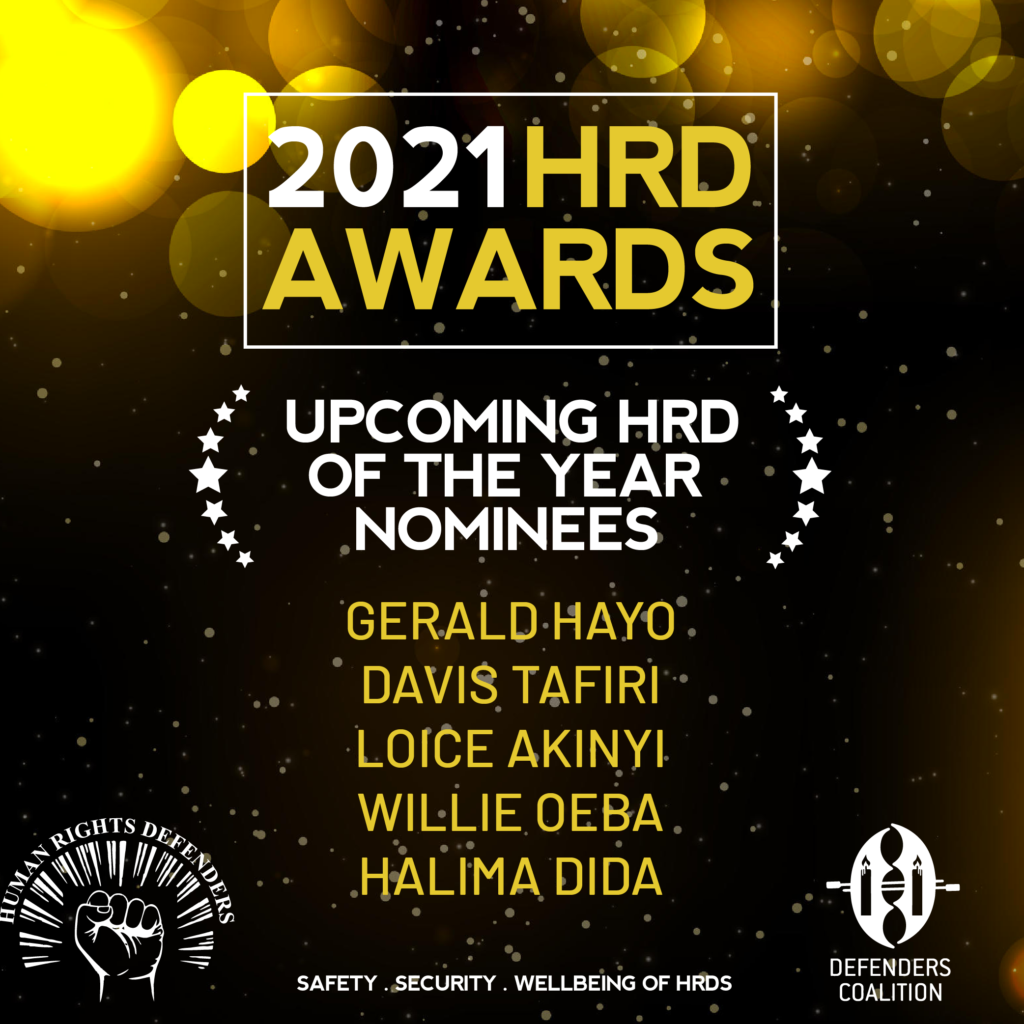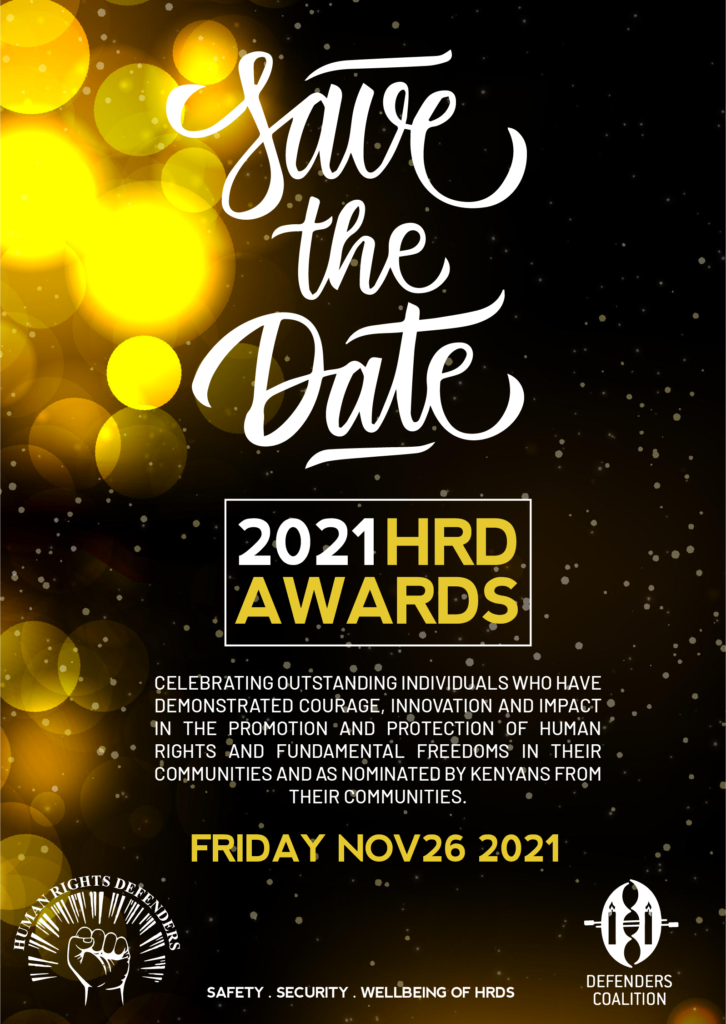
Athumani is a Muslim clergy from the coastal county of Mombasa, Kenya. He is a passionate human rights defender who also qualifies as a Trainer of Trainers. Athumani co-founded an organization dubbed Nuru Pwani, which focuses on the protection and inclusion of SOGIE community members in places of worship.
Athumani is an organizer guided by love, creativity, and passion. His motivation comes from the conviction that members of the clergy have a big role to play in shaping societies through everyday engagements. They realized that the clergy can be the conduits for creating safe spaces for all, especially for the safety of SOGIE community members. Together with others, Athumani responded to this by devoting his life to strategically engaging the clergy on SOGIE rights and by constantly engaging them to define their role in enhancing religious tolerance and community/faith narratives recognizing SOGIE rights.
This year, Athumani has worked towards increasing the safety among vulnerable GENDER & SEXUAL MINORITIES within faith realms. He has facilitated creation of safe spaces where muslim leaders and clergy convene to empower each other. They also exchange with each on the need and strategies of engaging with congregants and community members while putting inclusion practices into place.
The interventions that Athumani and other clergy offer to SOGIE rights are informed by regular identification of trends and risks affecting LGBTIQ people. They then converge to practically identify impactful solutions to the risks.
Athumani’s advocacy work has not stopped at the local level. He also uses his knowledge at the grassroot to come up with initiatives and policy proposals at the local, national and regional level for inclusion of LGBTIQ persons as well as to increase awareness on the responsibility of protection of LGBTIQ people in places of worship.
As a Muslim clergy who is a Trainer of Trainers on LGBTIQ inclusion, he has had experience in partnering with other faith-based institutions locally and beyond, to advance the cause of LGBTIQ people and well positioned to continue this work. He is committed to advocating for progressive change and also to the provision of platforms for key populations to advocate for their rights and safety. Due to his commitment to partnerships and collaborations, He is well suited to build upon the successes he has realized thus far as a human rights defender, and further the protection of LGBTIQ people and allies.
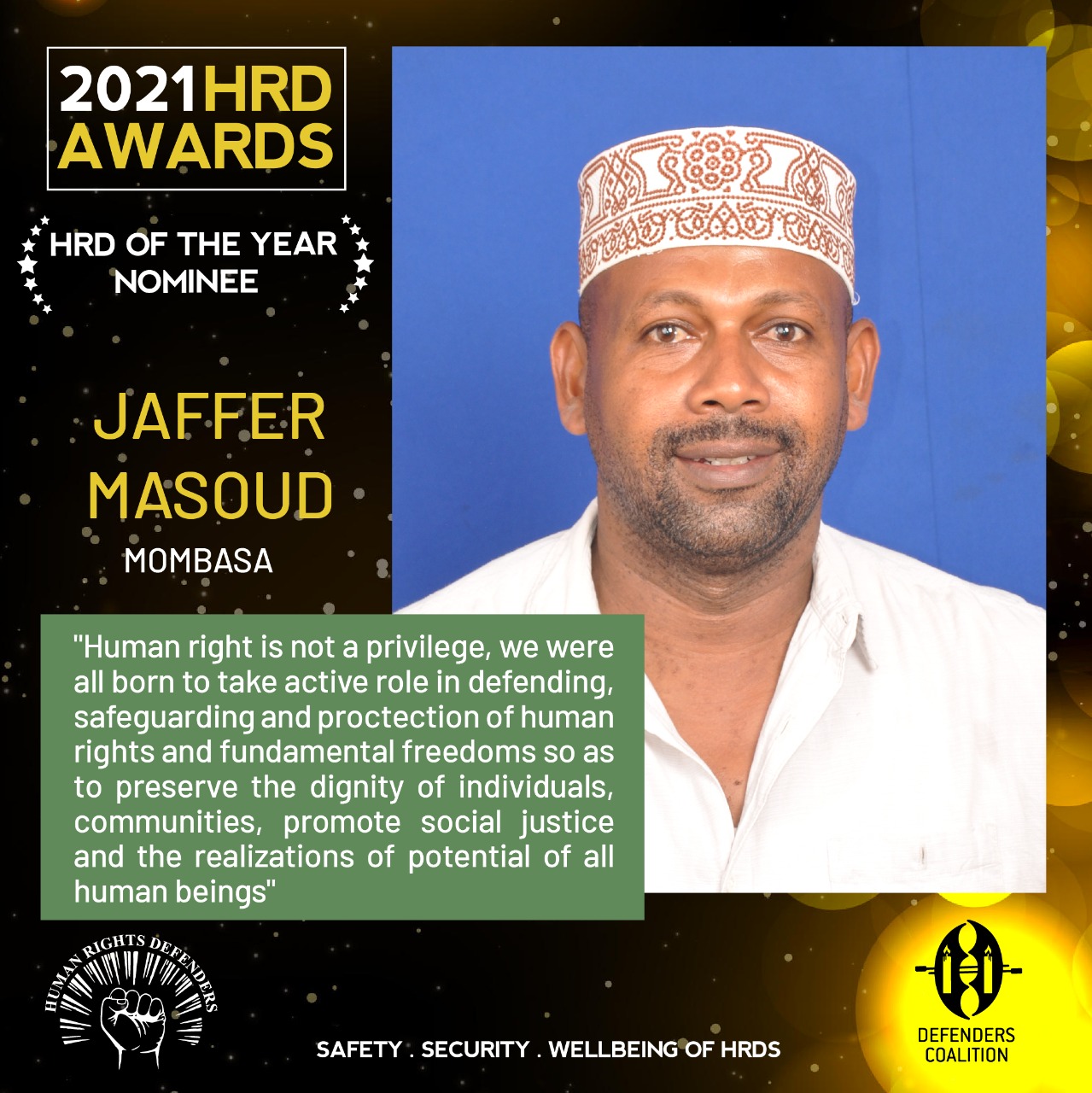
Jaffar Masoud Mbwana is a multi-talented, intelligent, energetic and well-presented gentleman with comprehensive skills set from Lamu County, the archipelago of the coast of Kenya. He is a passionate frontline human rights defender, Paralegal, public budget practitioner and a dynamic defender.
Jaffar kickstarted his activism career in 2010 by founding Faza Youth Action Group (FYAG) , a non-profit, independent and non-partisan human right community-based organization Lamu East within Lamu County. Faza Youth Action Group works towards defending and safeguarding social development and ensuring provision, protection and participation of his community in economic and social rights. Jaffar is a paralegal and a community facilitator in Lamu County and was among the pioneers and founders of Save Lamu, a human right organization advocating for the right to clean and dignified environment for coastal communities.
Jaffar also wears the hat of being the co-founder of Solidarity for Change movement in Lamu County which advocates for the demarcation of the Coast province in general. The organization also champions for the rights of minorities and marginalized communities. Jaffar also cofounded Muslim Women Advancement of Rights and Protection (MWARP) to spearhead the rights of women and girls in among muslim communities.
His dogma as a human right defender was informed by lack of representation of marginalized communities in the development narrative post the promulgamation of the Kenya Constitution, 2010 which allowed for devolved governments. He realized that the majority of the population lacked the capacity to critically contribute to an inclusive development agenda due to lack of social and economic empowerment. He, therefore, devoted his energies towards mobilizing the community and sensitizing them towards ensuring provision, protection and participation of youth in economic and social rights.
He believes that poor living conditions and poverty only exist due to social and economic evils conducted by those in power.
Through his efforts of mobilizing community members, he has been able to advocate for the demarcation of Vumbe land in Lamu East after which community members were enjoined in the demand for ownership titles to the pieces of land. As a result, over 100 women were able to get land and acquire titles of ownership for the same.
He has also partnered with the National Council of Persons With Disability (NCPWD), where they organize for mobile registration clinics in Lamu East various location, Shanga, Pate, Siu, Faza, Kizingitini, Mbwajumwali, Tchundwa, Myabogi, to map persons with disability for listing them to benefit from the national social protection services.
Jaffar has worked to hold duty bearers to account. He sensitizes the community on their mandate in the budget process as well as the need to emphasize on the implementation of projects as per the budget calendar timelines. He has trained several young women and men on the budget process and involved them in the process of following up on projects.
He has been involved in many peace negotiations with National Cohesion and Integration Commission (NCIC) to come up with the peace accord between Tchundwa and Mbwajumwali community that have been warring for many years. He also initiated peace accords between villages to maintain peace and live-in harmony as well as initiated the idea of forming and registering the village council of elders in all villages in Lamu East.
Jaffar initiated a drugs abuse awareness campaign in Lamu East and came up with a movement to curb the vice which has tremendous strides in referring drug addicts to the rehabilitation centers. He has also mentored many youths and continues to have mentorship sessions in primary and secondary schools.
He has received previous recognitions including the human rights defender unspoken hero of the year 2018.
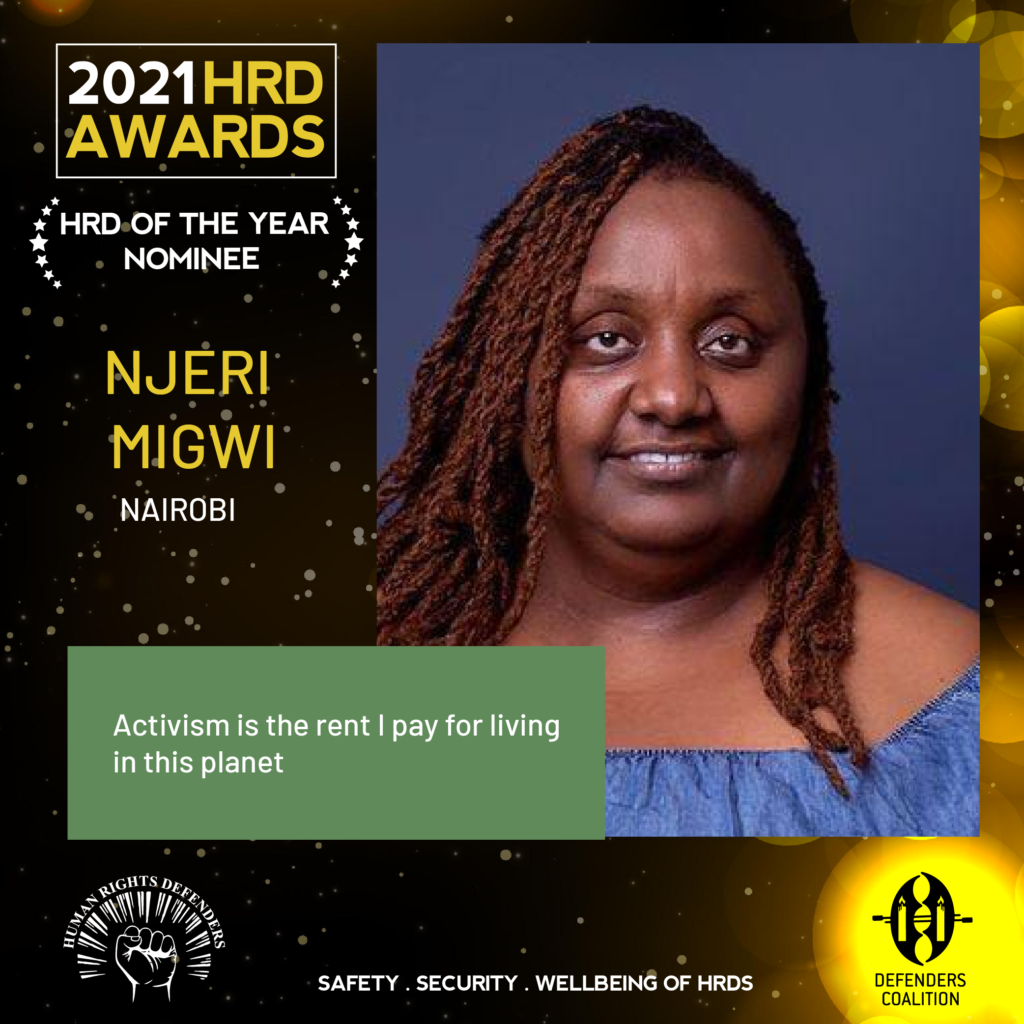
Njeri Migwi is a woman human rights defender, a mother of nine babies, 5 humans and four cats.
She is the Co-Founder and Executive Director of Usikimye, a platforms established to offer refuge for victims and survivors of sexual and gender based violence. With others, Njeri has put together safehouses that ensure that SGBV victims have a haven against the violations directed at them. She thrives in humour , is an avid RPG gamer and is an avid LOTR fan.
The idea of coming up with safe houses for victims of SGBV sparked when she was experiencing SGBV but had nowhere to call home away from the perpetrators. She realized that many victims and survivors of SGBV lacked a place to rest while they seeking mechanisms to hold the perpetrators to account.
She quickly closed the gap and established Usikimye.
Najeri is a firm believer of bouncing back from the moments of darkness associated with the SGBV.
Her love for defending and promoting other people’s rights does not end there. She has a soft spot for children. Together with others, Njeri co-founded Mama Rescue, an organization that responds to children in distress. She also supports a feeding programme , where at least 4000 mouths are fed every week. Njeri also helped establish a a mobile library and arts program to give alternative learning models for kids to kids and have fun while at it.
Through her leadership, Uskimye rescued numerous women and girls, children and infants. While her passion lies in women , she has never shied from rescuing men in violent relationships.Through her leadership, they have re-homed various members of the LGBTQ community to different neighborhoods due to an escalating corrective violations such as the gang rape silent pandemic.
Her work is guided by the awareness she has around SGBV issues. She employs community centered practices that ensure that local problems are addressed using locally available response mechanisms for reprieve. She hopes that her advocacy work will bear fruit at the preventive level where attitudes surrounding harmful cultural practices that perpetuate SGBV are completely eliminated

Abdishukri is a passionate Kenyan human rights defender and an activist born and brought-up in the marginalized communities of the north-eastern region of Garissa, Wajir and Mandera counties.
Many from the said counties consider him a generous a person. He has won the hearts of many by whole-heartedly lending a timely helping hand to the community in times of need. He has has horned his skill in human rights work as a field officer for Muslims for Human Rights, a leading human rights institution from the Coastal and North Eastern region of Kenya.
The community is happy that his work towards ensuring that cases are documented objectively and to be used when advocating for justice for victims of the violations.
Abdishukri wears a big hat. He supports victims and families of victims of enforced disappearances which are rampant in northern parts of Kenya and semi-urban settlements. He also advocates for the elimination of harmful cultural practices including gender based violence in largely patricahal communities.
His work of serving the community does not just end there. With other concerned members of the community, he spearheads efforts geared at holding to account duty bearers from the vast northern frontier. He also conducts adult learning and continually holds conversations that elicit aim to spark the desire of community members to demand for accountability. for common wananchi (citizens) to share their priorities and continually hold duty-bearers accountable.
The north-eastern region is known for a high number of extra-judicial killings and disappearance cases. Based on those human rights violations are the motivating factors for him to be a champion HRD who fights against any form of human rights violations in accordance with the rule of Law.
Abdishukri has realized the following milestones in his desire for a just society:

Willie Oeba is an urban wordsmith that creates powerful poetic pieces that give voice to individuals and help them tell their most powerful stories through spoken word poetry.
Oeba is an accomplished spoken word poet in his own right. He has perfected his trade since 2014. He has captivated wide-ranging audiences and peers alike with his phenomenal wordplay incorporating witty puns, deep metaphors, and brutally honest observations and perceptions of Kenyan life while still using his poetic gift to educate young people about human rights and gender mainstreaming and other life issues that we all face. His performances make many sit up with their ears pricked up, hanging onto every syllable he laces us with because of the quality of his lyrical content.
Willy is a graduate with a Bachelor of Science in Media Science from Moi University. He doesn’t shy away from speaking truth to power even on controversial topics like calling out corrupt leaders, addressing prejudices against women and girls. In an age where young artists are engrossed with their self-image, Oeba is deliberately enlightening and sarcastic on poetic analogies.
He is also a voice-over artist and social media influencer. His most recent accomplishment was the deliberate mobilization of the youth in Nakuru to form a community-based organization dubbed Voices Guild 254 that focuses on using art as a tool for social change and protecting human rights and dignity.
His spoken word poetry is driven by personal experiences, facilitating a true polyphony of diverse voices and making it easier for audiences to connect with. Importantly, it provides valuable insight into emerging social realities by illuminating the experiences and happenings at a personal and societal level. Having nearly been a statistic of extrajudicial killing as he was almost shot by a police officer on January 21st 2017, for mistaken identity. This incident and the urge to amplify voices of the vulnerable in the community prompted the creation of one of the most powerful pieces in the history of Kenyan spoken-word poetry, “Dear Mr President,” which sparked a national conversation on governance, social justice, extra judicial killings, defending democracy, leadership and integrity & governance in Kenya
Many high-profile artists and peers have hailed Oeba to be a poetry king of the new school as well as constantly being considered to be in the upper echelon of the current generation of poets taking Kenya and human rights spaces by storm. As a young artist, with the mentality impossible is a myth, he 2017 won the Blaze Safaricom music competition using Spoken Word poetry & later in 2018 was crowned The East African Spokenword Word Battle King after a six-round battle challenge.
Willie Oeba has devoted his artistry to defending human rights and dignity & promotion of social justice.He has two studio spoken word albums namely ISM & Dear God under the thematic area of human rights & social justice. Apart from being a performance & studio artist, Oeba has mentored Other artivists in the art space under a programme he started in 2019 dubbed ” Truth Is”, that seeks to raise Conscious artistic generation that can stand up to protect human rights and dignity.
As a youth from Nakuru, a town recording the highest number of criminal gangs & statistics on organised crime, Oeba has started a mentorship program in the informal settlement of Kivumbini that trains youths and young kids to capitalise on their artistic niche & that also brings the police & youth together to bridge on the mistrust and education both parties on human rights.
The extraordinary thing is that Willie Oeba never limits himself to conventionally doing things – he is always looking at different ways to communicate to and enrich his audience with truth and knowledge. He uses his poetry to bridge gaps, make people think deeper, ask questions and mirror the society we live in today. Through his poetry, he is a leader, a human rights defender, a champion for equality, a voice for the voiceless, a king in his own right and gifted Kenyan youth. His verses in poetry are words that need to be seen and watched to appreciate the fundamental role of creative and innovative approaches in defending and safeguarding human rights.
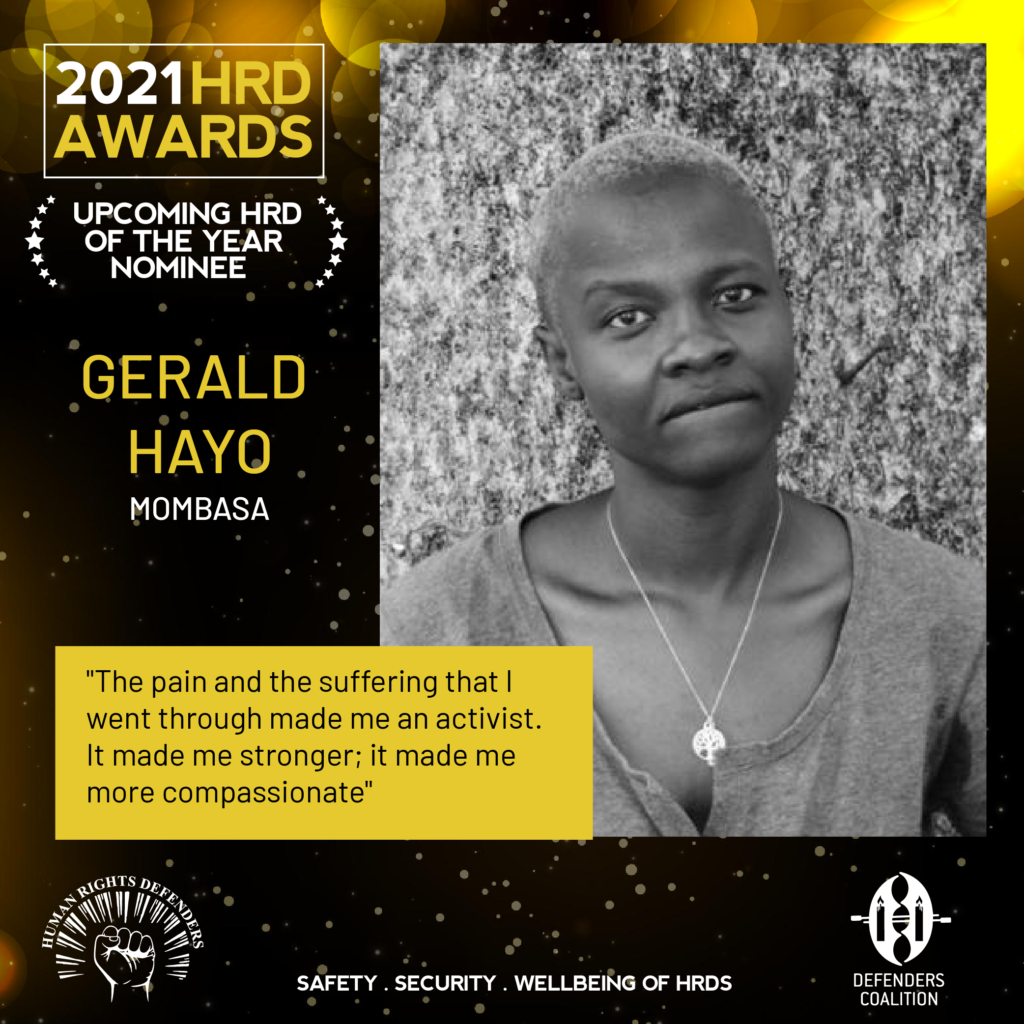 #HRDAwardKE
#HRDAwardKE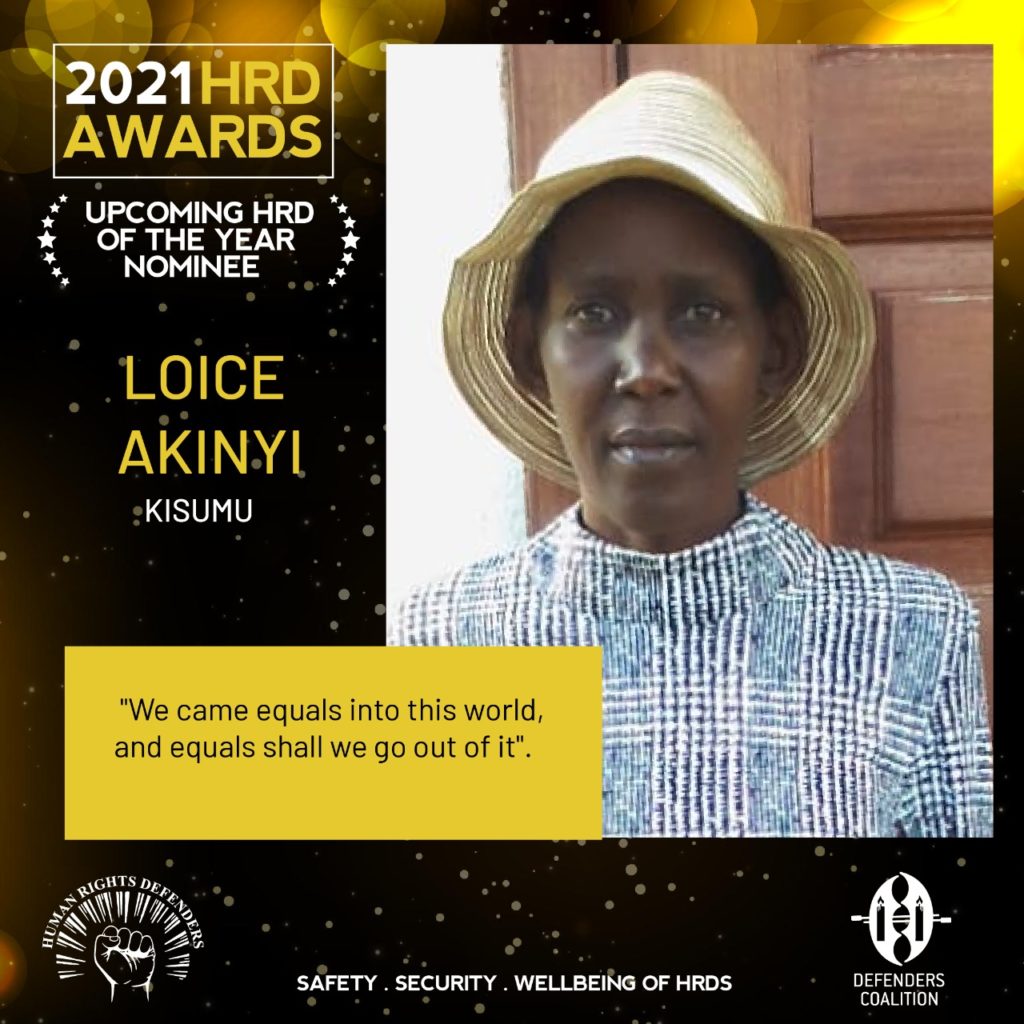 Loice Akinyi Omondi is a person with mental disability woman human rights defender from Kisumu County.
Loice Akinyi Omondi is a person with mental disability woman human rights defender from Kisumu County.
Loice is a survivor of mental ill-health and this was the motivation for her birthing into the promotion and protection of the rights of Person with Disabilities. She champions the rights of Persons with Disabilities (PWDs) across the Western Region of Kenya, specifically those with mental health challenges and who need regular medicare to live a dignified life.
She believes that all medical facilities ought to offer mental health services to people suffering from mental health diseases as well as have free clinical and pharmaceuticals.
Loice is the chairperson for the people with mental disabilities in Kisumu County. She is also the chairperson and founder of the Mental Disorder Group (MCBO) and she also offers liberty and awareness through advocacy.
Her work has revolved around supporting populations who suffer from mental disabilities. She has laos been on the forefront championing g for access to education by deserving students whose parents have mental disabilities thus unable to raise required school fees. She does this by ensuring that their plight is mainstreamed and they have access to scholarships and bursaries to facilitate their education journey.
From the time that Loice survived the mental illness, she realised that the world was not accommodative to persons with mental illnesses. It was difficult getting identity. She realized that the understanding of disability was very thin: that the world only recognized persons who are physically handicapped as the people who are with disabilities.
Loice has worked for many years to demystify this narrative. She has also championed access to justice by the victims of sexual and gender based violence and who suffer from mental disabilities. She has also been in the frontline fighting for their health programs, for instance the lack of an EEG machine to measure the electrical activity of the brain (in all Nyanza Hospitals). Through her efforts the county government of Kisumu recently launched medical programmes for persons with mental disabilities as well as an EEG at Jaramogi Oginga Odinga teaching and Referral Hospital.
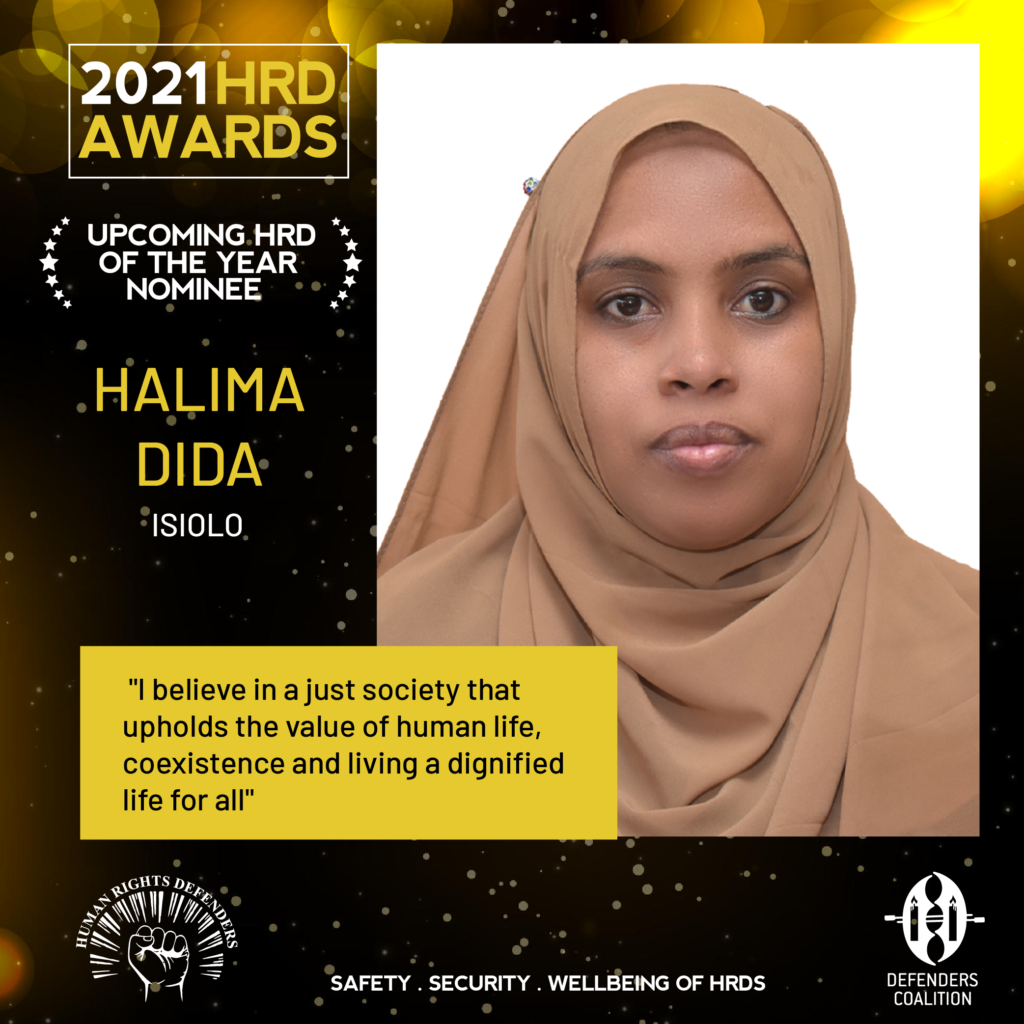
Halima hails from Isiolo County which is located in the Northern part of Kenya.
Halima wears the crown of being a mother of three and is the serving chairlady of Isiolo women of Faith which is an affiliate of the Inter Religious Council of Kenya. Halima has garnered experience in the human rights sector having worked with as a civic educator with local civil society actors. She is also a champion of preventing and countering violent extremism (PCVE) and serves as a member of the Isiolo County Committee on the prevention and countering of violent extremism.
In her line of work, Halima works with other women from different religious coordinating bodies, religious leaders and the interfaith youth to promote peaceful co-existence.
Her advocacy work revolves around the promotion of rights to equal opportunities in service delivery especially in access to quality and affordable health care, education and equal job opportunities.Halima has been passionate about the rights of marginalized communities from the Northern Frontier. She works closely with women who promote the rights of the girl child in largely patriarchal communities, works with the youth in mentorship and promotion of intergenerational exchange of knowledge and Persons With Disabilities keen to realize the implementation of the Persons With disabilities Act. She has also worked to promote inclusion of these groups in decision making processes and equal representation.
Halima began her human rights work as a volunteer in the year 2012 in the local community based organizations in her community, mainly advocating for the rights of women and girl child. During that time, she spearheaded anti Sexual and Gender Based Violence campaigns where she sensitized community members of the effects of the vices including harmful practices including Female Genital Mutilation.
Since 2015, Halima is actively involved with matters social budgeting project; which focuses on working with communities to identify gaps in county budgets and service delivery in three sectors namely health, water and education. She uses this form of community theatre to promote excellent service delivery and accountability.
Within her community, Halima is a dependable shoulder to lean on. She dares to work with a group of women who have lost their sons to alleged radicalization into terrorist groups. She offers refuge from the stigmatization, debriefing sessions as well as lending a voice against the extrajudicial killings of youths in the name of security operations.
Halima believes that the award will be a great inspiration to the individuals at the grassroots who stand up against human rights violations. It will enable them realize that their passion, good work, dedication and fighting for human rights is appreciated and recognized even if it is at the community level. She believes that will motivate and encourage other community members to stand up and advocate for human rights.
Want to share your story about championing Human Rights in Kenya? Write to us on obino@defenderscoalition or 0716 200100 for for collecting the story for publication.

Davis Otieno mostly known as Davis Tafari is a human right defender, a member of Dandora Community Justice Center, a citizen journalist working with HoodTV an online TV station and the social justice movement official photographer. Apart from being a human right defender he has a small group of talented children from the Dandora community that he teaches/directs them in theater performances. He is also a small business entrepreneur who sells shoes online. As a Human Right defender he directs the social justice centers traveling theater and also champions campaigns against police brutality and extra judicial execution. He is an ecological justice champion, and a member of the social justice centers organic intellectual where he write articles and does reflections on progressive books
He started his human rights work back in 2017 as a community organizer championing against police brutality and later joined Dandora community Justice Center in 2018 as a Photographer/Videographer up to date. He is the founder of the social justice centers traveling theater which started as Dandora community justice center theater team later extended to the larger movement. Since its existence they have been able to travel country wide advocating for social justice through art.
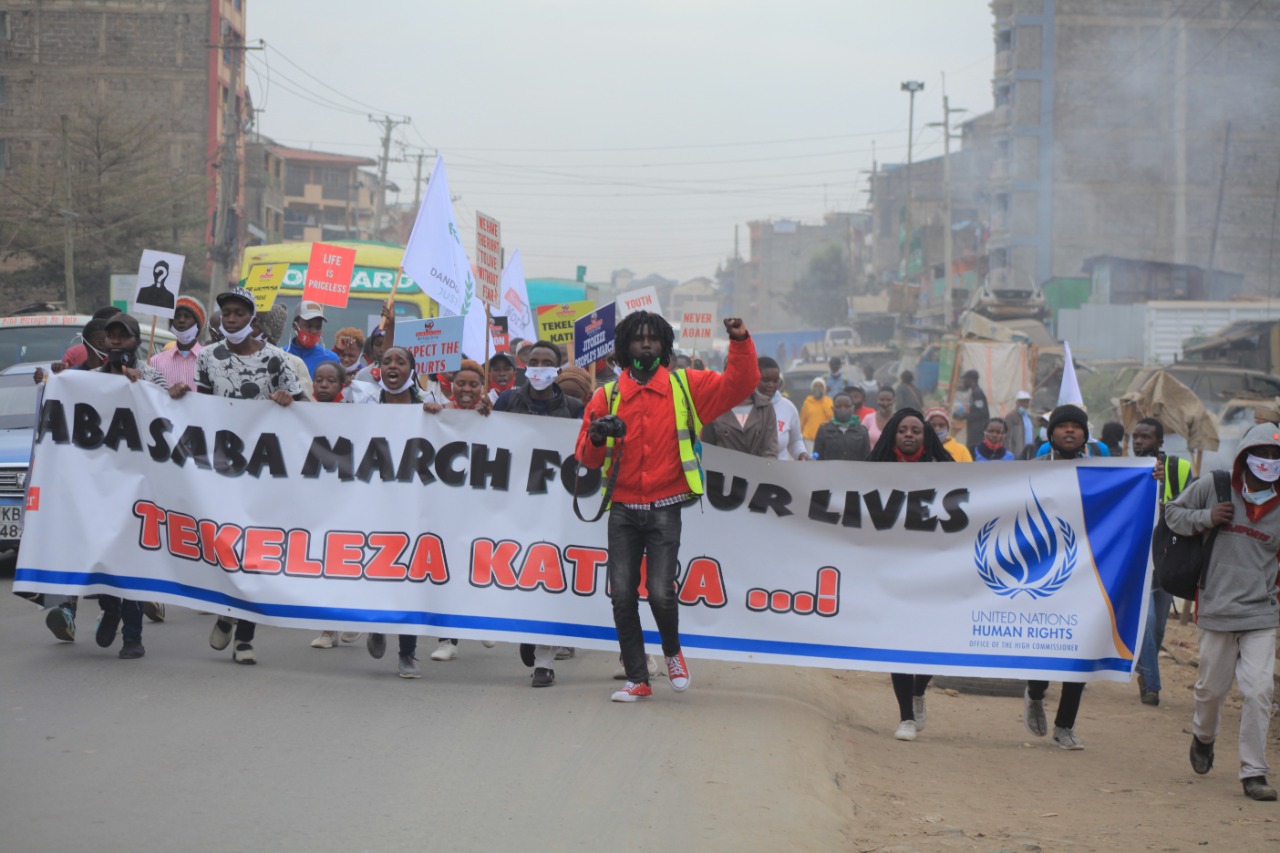
He is also co-founder of HoodTV online TV station which has been able to highlight the plight of the oppressed community through a program known as State of the Hood. He has been able to document demonstrations held by the social justice movement and other progressive organizations. He has also participated in the Climb for Justice Campaign as a photographer while in the social justice centers organic intellectuals. He has been able to record videos on the struggle of the poor and oppressed working class.
The most outstanding thing about him is that he has been able to address issues of criminalization of dreadlocks among the poor youths living in informal settlements. Through community forums he has been able to organize and sensitize community members on issues affecting them and how best they can be resolved through the implementation of the 2010 Kenyan constitution. As a young rasta man from the informal settlements of Dandora he has been arrested countless times in the name of dreadlocks and being in the front line leading demonstrations against police brutality.
The biggest challenge he experiences is working without a camera of his own. If he gets the award it will help him acquire his personal camera that will make it easier for him to continue documenting issues that are affecting his community and also documenting the good work that most of the human right defenders are doing. It will also boost his morale as a young Human Rights Defender from the informal settlements to continue advocating for dignified life for the oppressed and continuing defending rights.
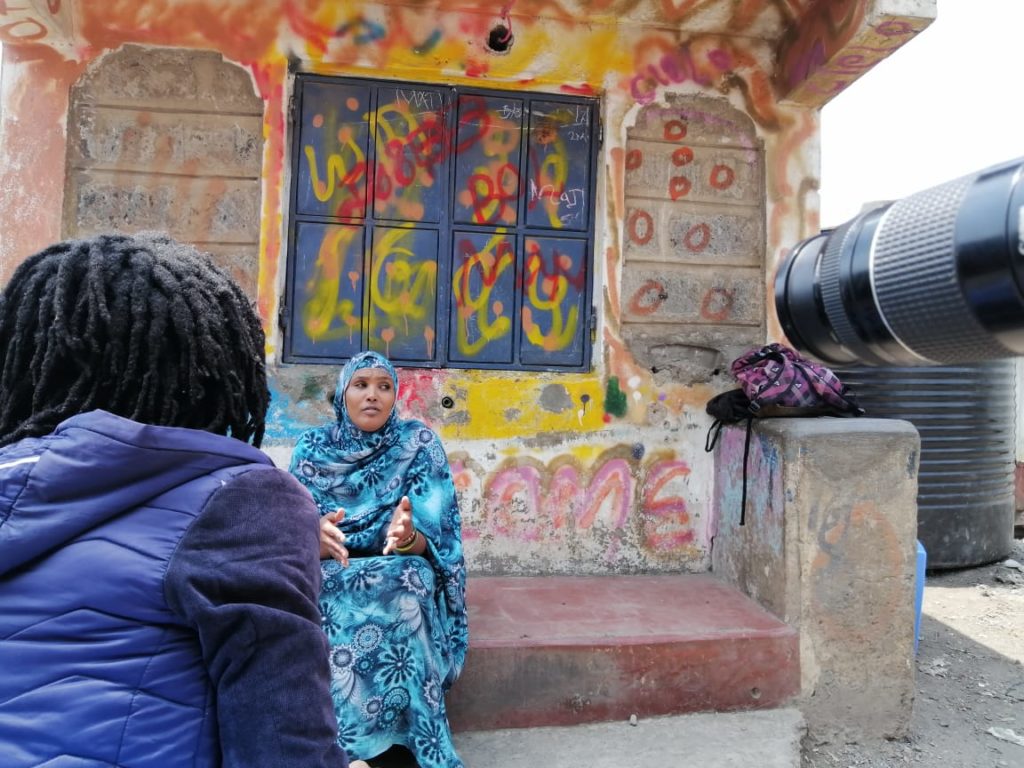
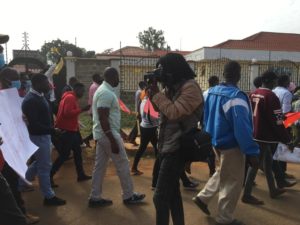

On 15th June 2021, Defenders Coalition in conjunction with the Working Group on Human Rights Defenders in Kenya sent out a call for nominations for HRD Awards 2021 that ran until the 30th July 2021.
We are happy that we received 432 forms in which there were were individual nominations. Out of the 122 nominations received, 10 nominees were shortlisted for two categories as follows:
The HRDs represent 10 thematic areas which include:
The nominees come from diverse thematic areas and also geographical locations. The nominees are drawn from 7 counties that include: Nairobi, Mombasa, Garissa, Nakuru, Isiolo, Kisumu, Lamu Counties.


